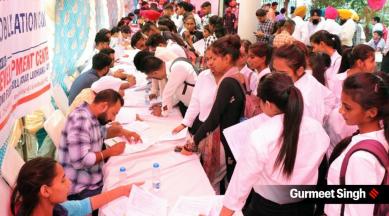Questioning submissions that 103rd Constitution amendment provides reservation to Economically Weaker Sections (EWS) without any “guard rails” — unlike in the case of reservations for backward classes, where conditions like maintenance of efficiency of administration is prescribed in Article 335 — the Supreme Court on Tuesday said the Constitution did not provide for any such guard rails even in the case of reservation for women.
“Look at Article 15(3), part of the original Constitution. That’s also an immutable fact because till you raise the status of women through employment…for that there are no guard rails. Backwardness, backward class commission, SC/ST commission — that kind of a constitutional mechanism is not provided…. Adequacy of representation is also not spoken of in 15(3), and yet it is a reservation,” Justice S Ravindra Bhat, part of a five-judge Constitution bench hearing petitions challenging the 103rd amendment, said.
He added, “This is just to flag one possible way of looking at it — that the original Constitution also thought of (the) kind of restorative or representational channel/mechanism which did not depend on this kind of identification”.
Article 15(3) enables the State to make special provision for women and children.
Justice Bhat was responding to submissions by senior advocate Meenakshi Arora, who told the bench presided by Chief Justice of India U U Lalit that in the case of EWS quota, “there are no guard rails and there is not even an endpoint”, unlike in backward class reservation, where “once they are adequately represented, there is an endpoint”.
“Maybe we haven’t reached there in the last so many years, but the point is, it envisaged an endpoint,” she added.
Also appearing for the petitioners, G Mohan Gopal, an academic, called the amendment an “attack on Constitutional vision of social justice” and “a fraud on the Constitution”. He told the bench, also comprising Justices Dinesh Maheshwari, Bela M Trivedi and J B Pardiwala, that going by the warnings of B R Ambedkar, “if this amendment is upheld, that will be the end of equality of opportunity”.
Gopal argued that equality was a demand of the people from backward communities, never of the elite, and that the backward classes are “not interested in reservation; we are interested in representation”.
Story continues below this ad
He submitted that the “time has come for this court…to recognise in the basic structure, a social justice code which is like the equality code, because the social justice code includes not only the equality code but also the basic structure feature of democratic governance”, besides various elements of Part 4 of the Constitution dealing with fundamental duties.
He reasoned that the classes eligible for reservation under EWS category are forward classes, and not backward.
Asserting that “social justice is the first objective of the Constitution and the heart and soul of the Republic”, Gopal said that the 103rd amendment is an “assault on (the) Constitution, assault on social justice, inserting into the Constitution for the first time a principle that in its essential framework reflects, rather than challenges the idea of inequality and privilege acquired by birth”.
It seeks to nullify and neutralise the Constitution’s very specific social justice agenda of treating unequals unequally to forge an equal society, and turns reservation, which is a weapon of social justice, against social justice, he argued.
Story continues below this ad
“This is not an economically weaker section reservation. This is reservation for socially and educationally forward classes with the creamy layer removed,” Gopal said. He added that “economic weakness has been substituted with financial incapacity” by way of the amendment.
Gopal pointed out that in some states, even some Brahmin communities which have had to suffer structural inequalities have been rightfully included as backward classes. He said, “What we want is representation. We don’t want an oligarchy to rule this country. We don’t want a backward class oligarchy…or a forward class oligarchy to rule this country. Because we know that when an oligarchy rules a country, all laws and policies will only be laid in the interest of that ruling community, and not in the interest of all.”
“And we saw how (in) the West, when they rose against aristocracy, and their oligarchies, and their monopolies, they managed to unleash the energy and talent of the common masses after they scientifically discovered that talent is not distributed in different ways among different classes. That upper classes do not have a greater share of brilliant people than poorer classes…. They moved forward through representation,” he said.
Gopal called the 103rd amendment the first reservation that has actually made social identity a criterion — “in effect it takes SC/ ST reservation and provides it to forward classes after removing the provision for social and educational backwardness”, he said.
Story continues below this ad
“Reservation is provided through backdoors to ensure that the constitutional method of providing reservation only to backward classes while denying reservation to forward classes to ensure that all classes would move towards adequate representation is nullified and destroyed,” he contended.
Gopal told the court that the “real design is to freeze social inequality. It is presented in a harmless way but this is the impact it will have.” He said, “As we speak, this amendment is dividing the country on caste lines. That’s the ground-level reality.”
He said the amendment is a fraud on the Constitution because the legislature knew it did not have the power to make such a law but yet went ahead with it. It changes the identity of the Constitution in the minds of the people as something which protects the privileged rather than the weak and underprivileged, he added.
